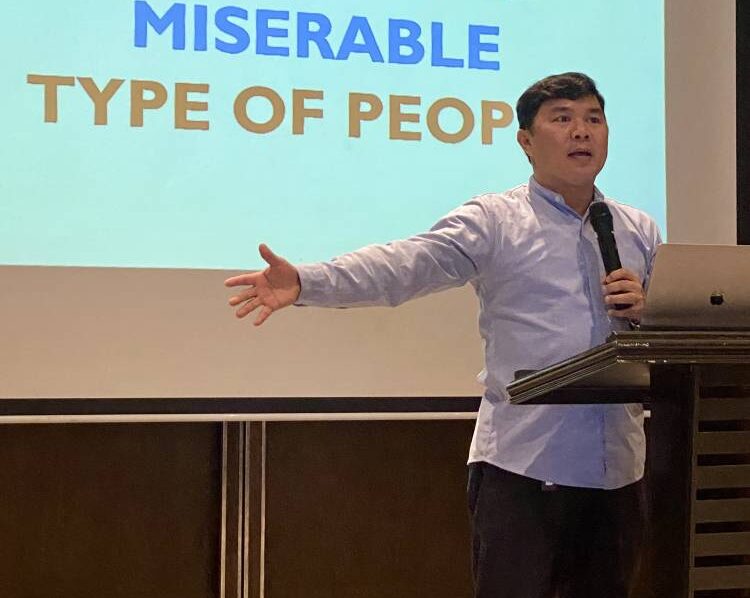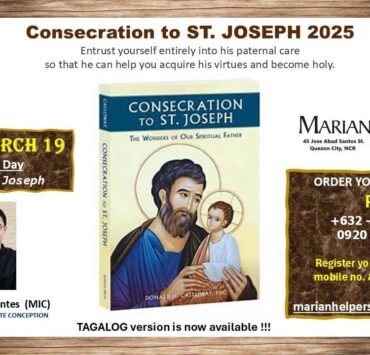The secret to a joyful life

Fr. Chris Salonga recently led an inspiring session for the Alabang East Chapter of the Brotherhood of Christian Businessmen and Professionals. With his signature humor and insight, he painted a clear picture of the difference between people who live with joy and purpose, and those who don’t.
He used the example of the impala, an African antelope that can leap 13 feet high but stays trapped inside a four-foot enclosure simply because it’s unsure of what’s on the other side. Many people live the same way—held back, not by actual barriers, but by fear and uncertainty.
So what separates the happy from the miserable? It all boils down to mindset, choices, and how they respond to life’s challenges.
Happy people love themselves for who they are, as beloved children of God. Miserable people base their self worth on what others say about them.
Happy people work hard, use their gifts well, and try to make the best of every situation. Miserable people blame everything and everyone when things go wrong.
Happy people forgive, even when it’s difficult. They also know how to apologize when needed. Miserable people hold grudges and say, “Over my dead body!”
Happy people get angry but express it healthily. They seek a resolution and move forward. Miserable people claim they’re not angry but refuse to connect, cooperate, or communicate. Their anger is dangerous, silent but destructive.
Happy people see solutions in challenges. Miserable people see problems in solutions.
Happy people focus on their mission and don’t care who gets the credit. Miserable people focus on personal gain and demand recognition.
Happy people embrace imperfections and still give their best. Miserable people want everything to be perfect, thus setting themselves up for a lifetime of disappointment.
Say ‘thank you’ and mean it
Happy people think before they speak. Miserable people speak first, think later, and regret it afterward.
Happy people give more than they get, only to receive more. Miserable people always want more and feel entitled to it.
Happy people say “thank you” and mean it. Miserable people say “thank you” but secretly resent it.
At the core of it all, happiness is a choice. Jesus said, “I am telling you this so that my joy may be in you and your joy may be complete.” (John 15:11)
Fr. Salonga observed that some people are miserable because they don’t know their purpose. Others know it but never act on it. The happiest people? They wake up every day and work on their purpose.
Jesus recognized this human tendency toward hesitation and self-sabotage. He said, “The harvest is great, but the laborers are few.” Too often, we become stuck in patterns of indecision, doubt, and contradiction. “Some people stay sick because they don’t truly want healing. Some people remain poor because they refuse to change. Some even find comfort in their suffering because it becomes part of their identity,” said Fr. Salonga.
So, how do you break free? Every great transformation starts with a moment of decision.
Turning points
Fr. Salonga shared these turning points from the Bible.
When Jesus told the man at the pool of Bethesda, “Stand up, pick up your mat, and walk,” he did so in faith. If you’re stuck, it’s time to act. Change starts with standing up. Stop waiting for life to fix itself; take responsibility.
David chose courage over fear in facing Goliath. Face your giants and overcome fear by stepping forward in faith.
When the blind man Bartimaeus cried out, “Have pity on me!,” he received healing. So ask for help, too: “Lord, have mercy on me!”
Jesus called the tax collector Zacchaeus down from the tree and transformed his life. The woman who touched Jesus’ cloak reached out in faith and was restored. Saul’s encounter with Jesus on the road to Damascus changed his life. The lepers who moved toward the Syrian camp took action and found salvation.
So take the first step, and stop making excuses. Move toward healing, restoration, and purpose.
Sadly, not everyone will make that move to a better life. Fr. Salonga noted that some reject healing, even when offered. They stay in poverty, even when provided a way out. They find twisted comfort in being unhappy. The danger is when suffering becomes a lifestyle instead of a temporary season.
Happiness isn’t something you stumble upon; it’s something you commit to daily. To get there, Fr. Salonga offered this simple formula:
Desire – Do you truly want to change? Want a better life.
Belief – Do you believe that change is possible? Trust that it is.
Action – Are you willing to make a move? Take steps toward it daily.
Happiness isn’t reserved for a lucky few. It’s for those who live with faith, purpose, and gratitude. Choose joy, live purposefully, and make the world a little better than you found it.

















